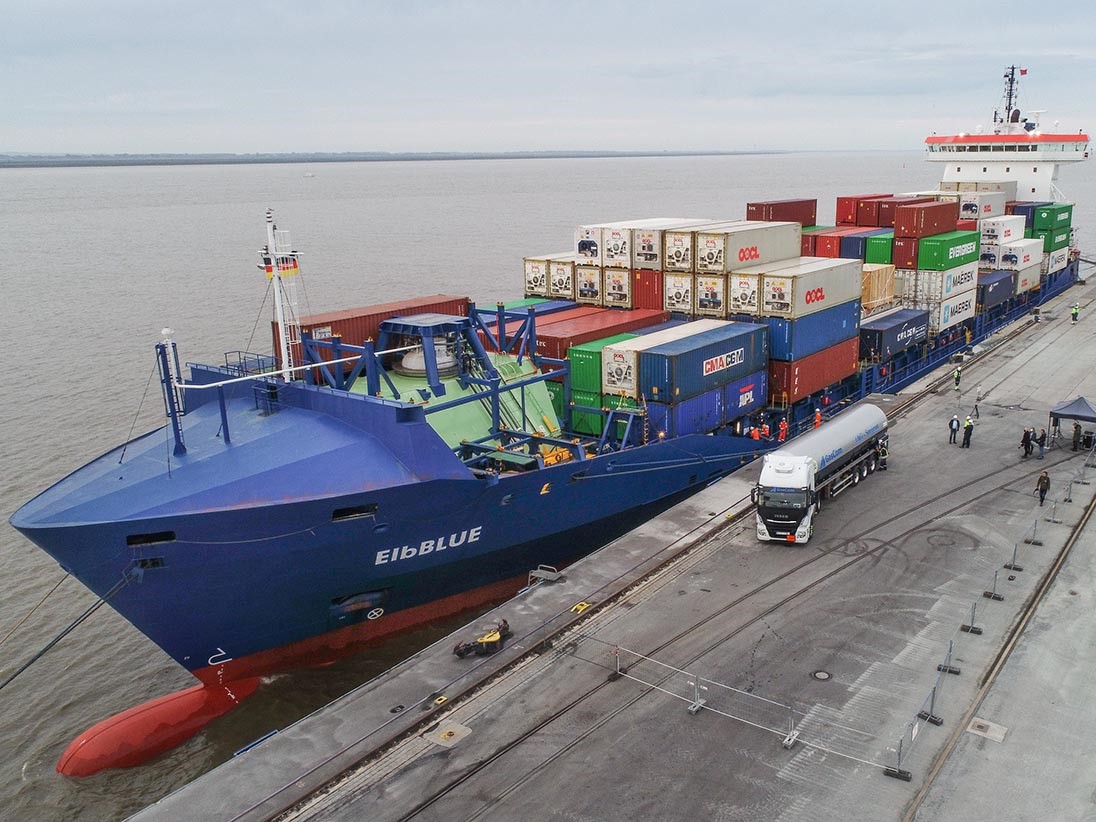
MAN Energy Solutions, Elbdeich and Unifeeder have made the world's first refueling of synthetic LNG blended with fossil LNG. On 30 September the container ship "ElbBLUE" - owned by the German shipowner Elbdeich Reederei and managed by the charterer Unifeeder - bunkered about 20 tons of green synthetic natural gas (GNS) in the port of Elbe in Brunsbüttel, Germany.
The ElbBLUE, formerly called "Wes Amelie", sails the North Sea and the Baltic Sea, is a 1,036 TEU container ship converted to LNG in 2017 when its MAN 8L48 / 60B main engine was adapted to the current MAN 51 unit / 60DF four-stroke dual fuel, with diesel as a reserve. The conversion showed that existing engines could be converted to LNG operation with a huge reduction in emissions.
Synthetic LNG was produced in a power-to-gas plant in Werlte, Germany, owned by kiwi AG that uses only renewable energy. Blending with synthetic LNG reduces direct emissions by 56 tons of CO2. of the ship's for the next voyage. The storage and conversion of electricity is generated in periods in which the fluctuating generation of renewable energy exceeds the demand. Power to gas enables the decoupling of energy from the electricity distribution sector for use in other sectors.
On the occasion Wayne Jones OBE, Chief Sales Officer of MAN Energy Solutions said: “This is an important flagship project, essentially a proof of concept for the maritime energy transition. At MAN Energy Solutions, we firmly believe in the synthetic fuels roadmap, but joint efforts across the industry are needed to make it happen. Governments need to establish a framework to make synthetic fuels readily available, while power-to-gas needs to be developed on an industrial scale to bring down costs and make truly sustainable fuels a reality”.
Stefan Eefting - Senior Vice President and Head of MAN PrimeServ, Augsburg - said: “In reducing or even eliminating future emissions from the global supply chain, synthetic fuels and engine retrofits have a crucial role to play. While an LNG retrofit instantly reduces a ship's emission levels, synthetic fuels can allow it to run 100% climate-neutral. We are demonstrating that any LNG-adapted ship can also run on fuels generated by power-to-gas technology and even as a mix of fuels depending on availability. However, to date synthetic natural gas still costs 3 to 6 times more than traditional LNG”.
Jens Moje, managing director of Elbdeich, said: “We consider the decarbonisation of the maritime sector to be inevitable - and very welcome - and we are delighted to play a pioneering role in its progress.” Timm Niebergall, director of Shortsea Unifeeder, said: “We think that the future availability of green fuels will be essential. Synthetic LNG is an exciting product and we are therefore very proud to be the first Feeder & Shortsea operator to test this new fuel on one of our ships." Hermann Pengg-Buehrlen, CEO of kiwi AG, said: "Our e-gas plant was the first multi-megawatt plant in the world to generate synthetic natural gas from CO2 and renewable electricity. The liquefaction unit went into operation it was specially designed for the liquefaction of synthetic natural gas in 2021. We are very proud to deliver the world's first SNG in the marine sector to MAN and Elbdeich.”
Source: MAN
 EN
EN  it
it

